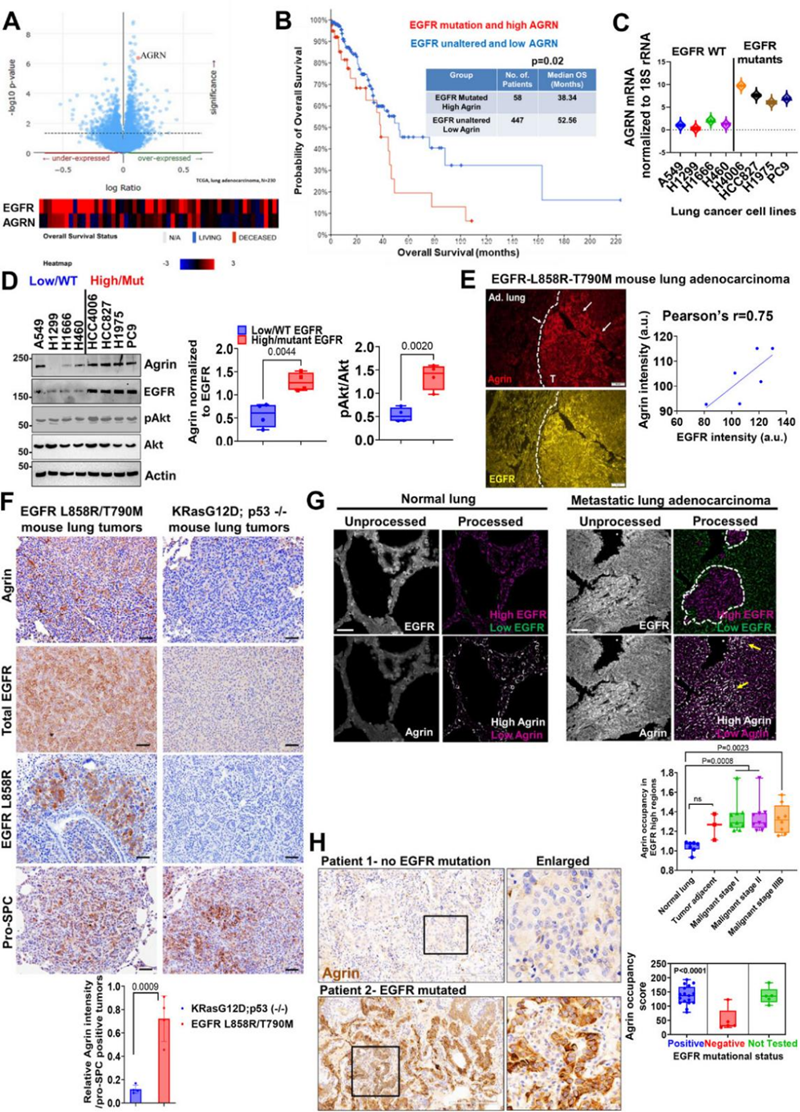Today, lung cancer is one of the leading causes of cancer-related deaths worldwide, especially lung adenocarcinoma (LUAD) in non-small cell lung cancer, which accounts for the majority of lung cancer cases. Although targeted therapy and immunotherapy have made significant progress in recent years, the high recurrence rate and drug resistance of lung cancer remain a huge challenge in clinical practice. Fortunately, scientists have never stopped exploring.
Recently, in a research report entitled "An Agrin–YAP/TAZ Rigidity Sensing Module Drives EGFR-Addicted Lung Tumorigenesis" published in the international journal Advanced Science, scientists from Roswell Park Comprehensive Cancer Center and other institutions found that a protein called agrin may be a key factor in lung cancer resistance and recurrence. This discovery is expected to bring new hope for the treatment of lung cancer patients.
In the article, researchers revealed the connection between epidermal growth factor receptor (EGFR) gene mutations and agrin protein. EGFR gene mutations are key carcinogenic factors in many cancers, including lung adenocarcinoma. Studies have found that EGFR gene mutations lead to overexpression of agrin protein in the extracellular matrix (ECM), thereby enhancing the supportive role of agrin in the progression of lung adenocarcinoma. In other words, agrin protein is like an "accomplice" that helps cancer cells with EGFR gene mutations survive and spread better in the body.
| Cat.No. | Product Name | Price |
|---|---|---|
| CLKO-1660 | EGFR KO Cell Lysate-HeLa | Inquiry |
| CLOE-1813 | Human EGFR Insect Cell Lysate | Inquiry |
| CLOE-1814 | Human EGFR HEK293 Cell Lysate | Inquiry |
| CLOE-1815 | Human EGFR(His) Insect Cell Lysate | Inquiry |
| CLOE-2307 | Mouse Egfr HEK293 Cell Lysate | Inquiry |
| CLOE-2308 | Mouse Egfr(Fc) HEK293 Cell Lysate | Inquiry |
| CSC-DC004772 | Panoply™ Human EGFR Knockdown Stable Cell Line | Inquiry |
| CSC-RO0126 | Human EGFR Stable Cell Line-Ba/F3 | Inquiry |
| CSC-RO0127 | Human EGFR-C797S Stable Cell Line-Ba/F3 | Inquiry |
| CSC-RO0128 | Human EGFR-D770_N771insSVD Stable Cell Line-Ba/F3 | Inquiry |
| CSC-RO0129 | Human EGFR-DEL19 Stable Cell Line-Ba/F3 | Inquiry |
| CSC-RO0130 | Human EGFR-DEL19/C797S Stable Cell Line-Ba/F3 | Inquiry |
| CSC-RO0131 | Human EGFR-DEL19/T790M Stable Cell Line-Ba/F3 | Inquiry |
| AD05317Z | Human EGFR adenoviral particles | Inquiry |
| LV00267Z | Human EGFR lentiviral particles | Inquiry |
This study not only reveals the mechanism of action of agrin protein in lung cancer, but also proposes a combined treatment strategy for agrin, which is expected to improve the effect of EGFR targeted therapy and reduce the risk of lung cancer recurrence. The researchers confirmed the important role of agrin protein in lung cancer through experiments on lung cancer cell lines, genetically engineered mouse models and human samples, and demonstrated the possibility of interrupting disease progression by inhibiting agrin. In addition, the researchers also proposed an exciting prospect that in the future, a simple blood test may be used to evaluate patients' response to EGFR treatment, predict the risk of lung cancer recurrence, and provide important basis for clinical treatment decisions.

Figure 1. Agrin as a co-dependent protein for EGFR-driven lung cancers.
The researchers found that agrin protein can enhance the activity of EGFR through interaction with EGFR receptor, thereby promoting the adhesion of cancer cells to the extracellular matrix and the perception of tissue hardness. This interaction not only depends on epidermal growth factor (EGF), but also involves other unknown mechanisms. More importantly, this interaction between agrin and EGFR can also form a positive feedback loop with the YAP-TEAD mechanical sensing pathway, which is crucial for tumor formation. In short, agrin protein is like a "bridge" that connects EGFR and extracellular matrix and helps cancer cells better sense and adapt to changes in the surrounding environment to promote tumor growth and spread.
The researchers said that these findings need to be verified in more clinical trials. Future research will focus on the development of specific inhibitors for agrin and explore its application in the treatment of lung cancer. In addition, they also plan to further study the role of agrin protein in other types of cancer, so as to bring treatment hope to more cancer patients. In summary, this study provides a new perspective for scientists to recognize the important role of agrin protein in lung cancer. By deeply exploring the interaction between agrin and EGFR, scientists are expected to develop new treatments to improve the survival rate and quality of life of lung cancer patients. Future lung cancer treatments should focus not only on cancer cells themselves, but also on the microenvironment in which they reside, especially key proteins in the extracellular matrix. Researchers expect these research results to move from the laboratory to the clinic as soon as possible, bringing new hope to lung cancer patients.
Reference
Mokhtari R B, et al. An Agrin–YAP/TAZ Rigidity Sensing Module Drives EGFR‐Addicted Lung Tumorigenesis. Advanced Science, 2025: 2413443.

